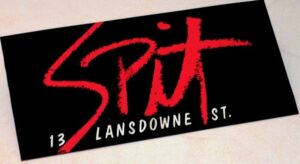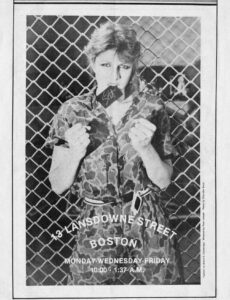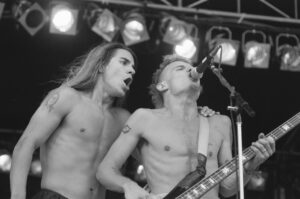By Colin McCandless
Contributing Writer
BOSTON – Spit was a 1980s Boston nightclub with an attitude as in-your-face as its name. It opened in 1979 and was located on lower Lansdowne Street across from Fenway Park. It was a punk/new wave nightclub that featured DJs on most nights but also occasional live bands.

Anti-dress code
The area around the bar was poorly lit, which added to the dark and foreboding atmosphere, and the building was painted black with one small door. A sign at the entrance proclaimed what basically amounted to a ban on disco attire of any kind: “No polyester, no polo shirts, no leisure suits, no gold chains.”
Its informal dress code was decidedly downscale. The punk ethos was on full display as patrons sported black leather, torn shirts and pants, fishnet stockings, chains, dog collars, spiked and studded wristbands, garish makeup and spiky and colored hair. The Boston Herald once described Spit as a “decadent den of iniquity,” and the “epicenter of Boston’s punk/New Wave scene.”

According to Boston Magazine, its peculiar appellation was the brainchild of Patrick Lyons, an entertainment mogul who now oversees the dining and entertainment company Lyons Group, who owned the venue and aimed to “come up with the grossest name he could think of.”
Lyons rapidly turned Spit into a popular nightclub, by hiring DJs who brought punk rock to the Boston club scene, such as Edward Hyson, known by the moniker Oedipus, who created the first punk radio show in America while a DJ at MIT’s college station WTBS and would later become the program director at WBCN. Lyons is credited with pioneering a party approach at Spit called “double-decking,” where a band played a set, then the club would follow that up with a DJ to keep the good times rolling and the crowd bumping.
An alternative music refuge
Spit became known as a haven for people who wanted something different than the prevailing music style of the ‘80s—something edgier—and sought out punk, post-punk, New Wave and hardcore punk. Bands that performed there over the years included everyone from local favorites like Mission of Burma and Human Sexual Response to the Ramones, The Pogues, the Dead Kennedys, and The Smithereens. The Red Hot Chili Peppers played Spit in 1984, taking the stage in their customary lack of dress save for a sock covering up their naughty bits.

Photo/Wikimedia Commons/Rob C. Croes
There were also times when the club, which had a capacity of 600 people, wouldn’t announce the acts in advance, and people would show up in droves anyway just to see who the mystery band might turn out to be on that particular evening. On nights when there were just DJs, people came to dance their tails off to punk and New Wave tunes. An article in BostonMan Magazine recounted that Spit hosted a House Music Night every Friday. Sunday was gay night, during an era when being openly gay was nowhere near as prevalent as it is today.
On the Music Museum of New England website, one former patron reflecting on the impact Spit had on his life. Jeff Booth characterized the music there as “raw, hard and real,” adding that “basically, it represented the Wild West of what was possible and none of the music was passive, regardless of the particular genre.”
He recalled how the bartenders would mingle and interact with the crowd, including Dini Lamot of the Boston band Human Sexual Response, who would “spray bad dancers with seltzer on a regular basis.” Booth also recollected that Lamot invented a cocktail called the “Mat,” an amalgamation of all the liquors that had spilled into the bar mats from that night combined into shot glasses. This “mixed” drink came with the hefty price tag of $10, quite an exorbitant amount for the average customer in the 1980s.
Musicians sometimes interacted with staff as well. Frank Zappa once bought a Spit T-shirt and asked a club employee to spit on it, to which she readily obliged, much to his delight.
The end of an era
Spit lasted until 1987, when it became another club called Axis. Despite its relatively brief existence, the venue attracted a loyal following, and there is still an active Facebook page dedicated to Spit and Axis, along with other iconic Boston nightlife spots.
The Old Dirty Boston Facebook page has also given the club a shout out that elicited a bevy of comments as people waxed nostalgic about Spit and shared their memories and anecdotes.
Victoria Palmer recalled a wild night when the actor, comedian and screenwriter Dan Aykroyd bumped into her while she was on the dance floor. “He was high as a kite,” she recollected. “My boyfriend said to him, ‘Welcome to Boston, Mr. Aykroyd,’ and put his hand out to shake. He (Aykroyd) looked at his hand like he was on Mars, then his security team whisked him away.”
Vickie Dyckes, who attended the Art Institute of Boston, said she would go there every Friday night. She remembered Spit as a fun, crazy place where you could let loose. “Because we were regulars, we could always jump to the front of line. Love the music, the New Wave sound, dressing in black, staying ‘til close.”
Another person related that the radio station WBCN would hold afternoon concerts at Spit during a weekday where you got treated to a free beer and a hot dog. Others simply reminisced about what they considered at that time to be their favorite nightlife spot, with Spit buttons, cards and stickers proclaiming their allegiance to a place where they felt right at home on the dance floor.
Booth concluded of Spit that it was more than just a club; “It was an attitude.”
RELATED CONTENT:
Boston’s legendary rock club ‘The Rat’ is still remembered fondly
The Channel nightclub was one of Boston’s top live music spots in the ’80s












